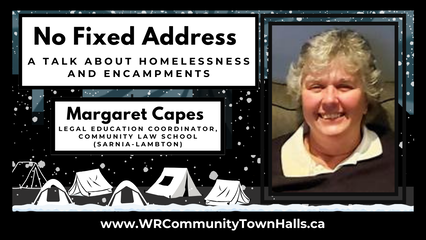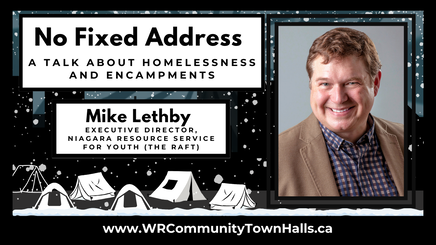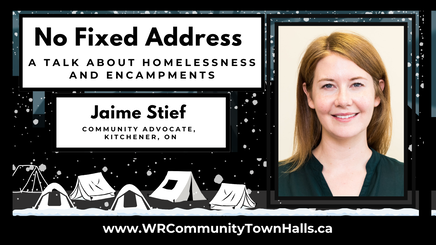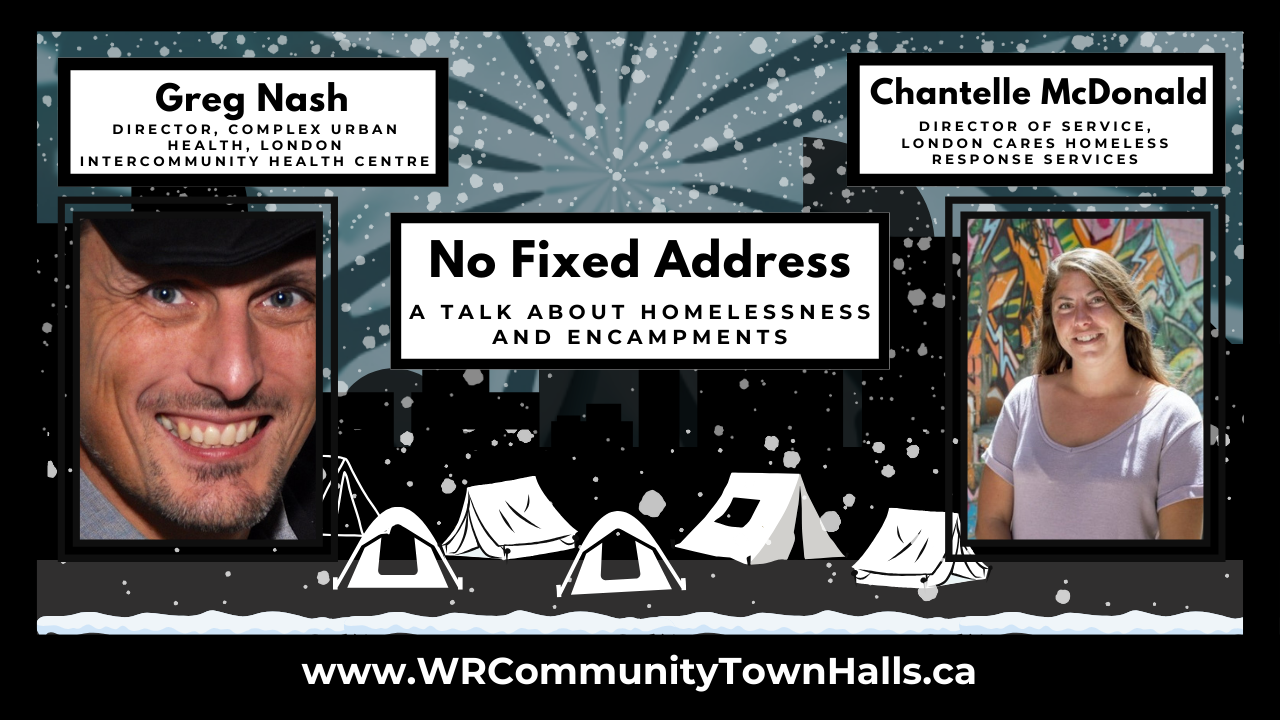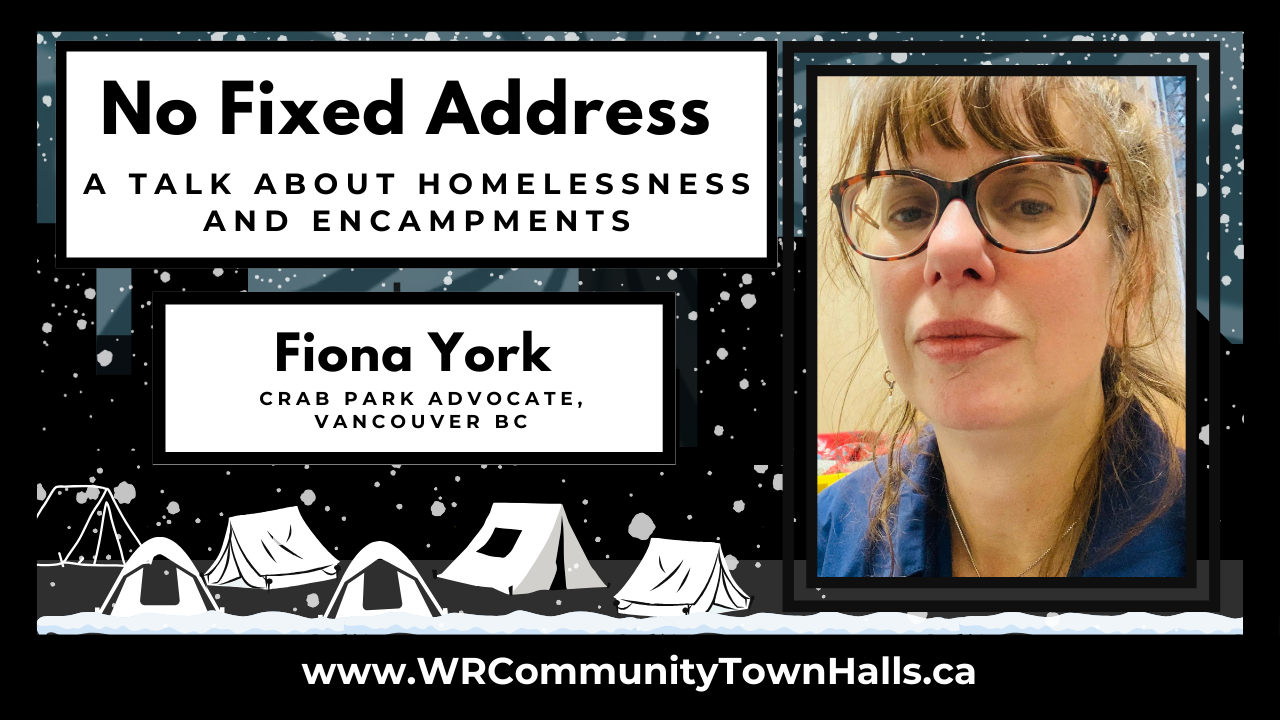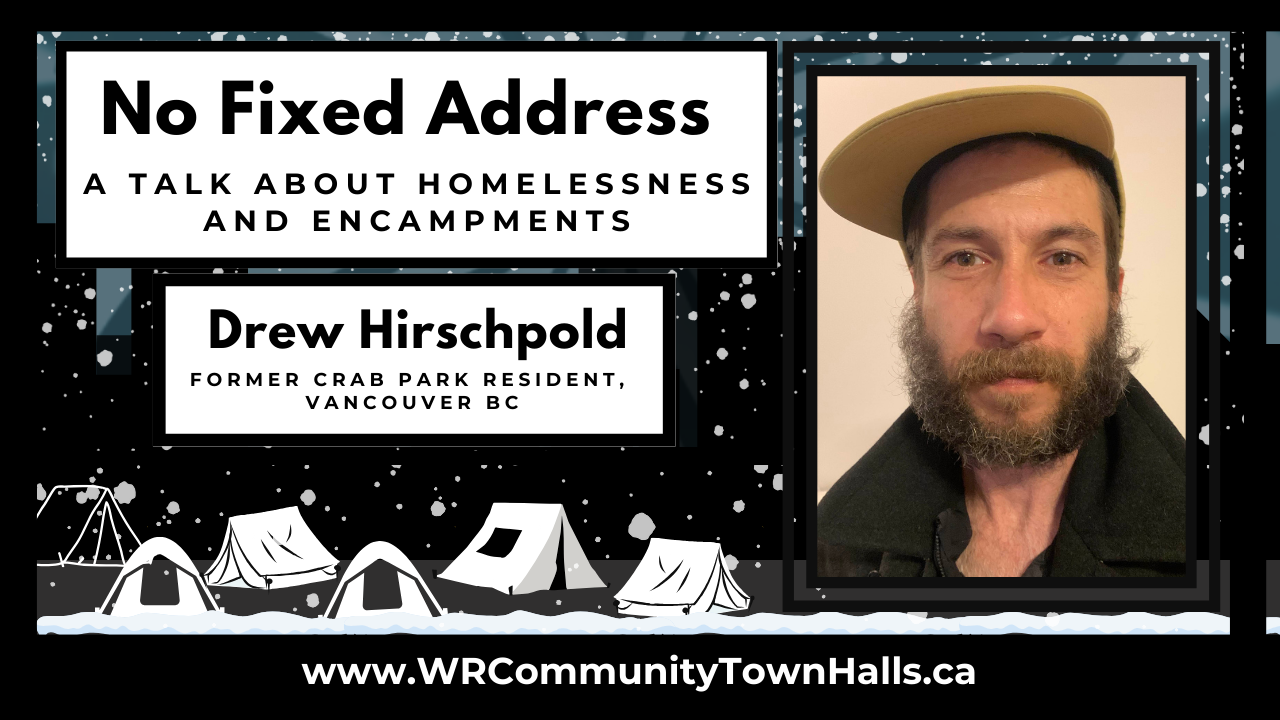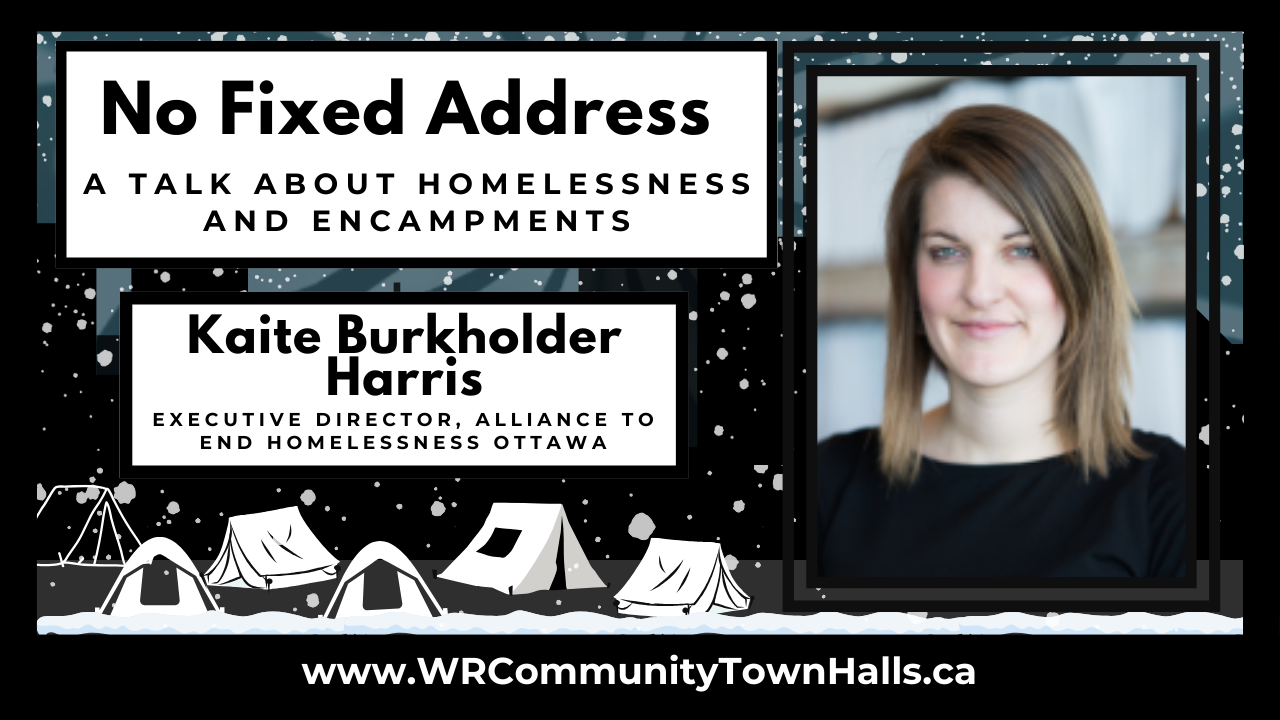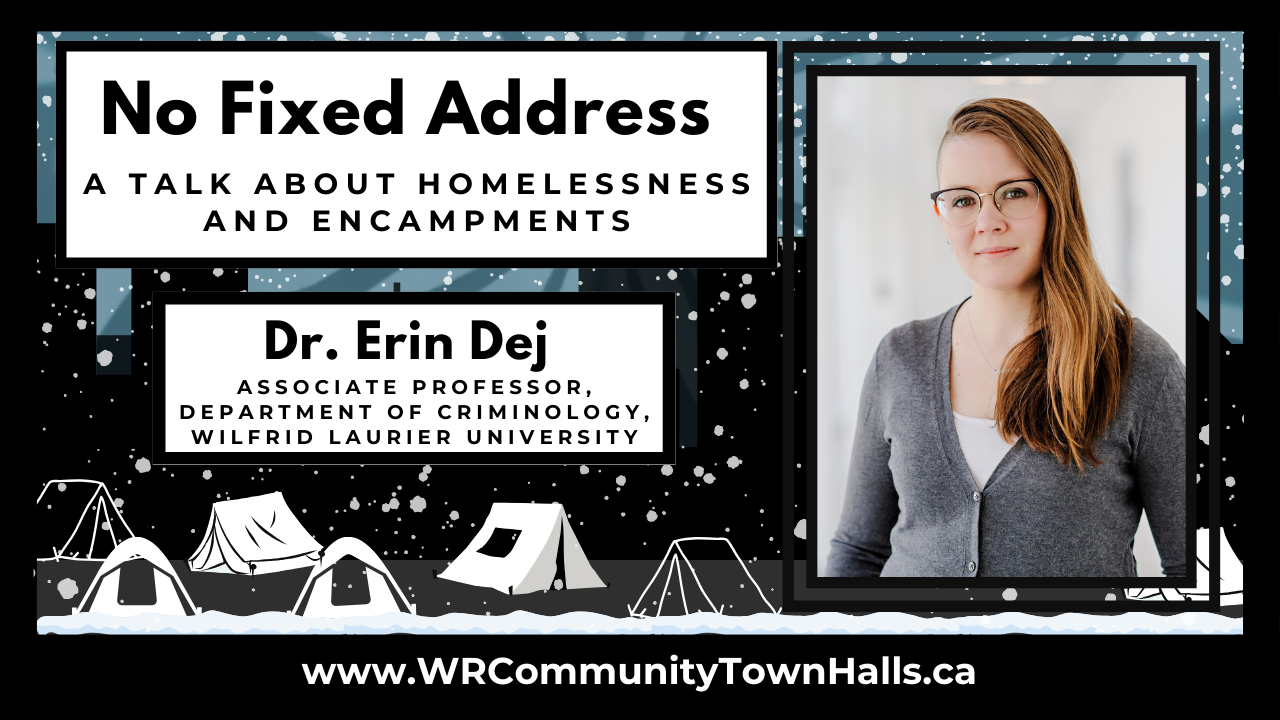Panel Summary - Report
Introduction & Speakers
"No Fixed Address", a virtual town hall held in February 2024, provides a sobering overview of the homelessness crisis. It was prepared and facilitated by Waterloo Regional Councillor Rob Deutschmann and included a diverse array of speakers, each contributing unique insights and perspectives on the issue.
Margaret Capes focused on educating the unhoused about their legal rights and building trust to combat "relational poverty." She highlighted the lack of awareness among the unhoused about their rights and the necessity of legal advocacy to ensure compliance with decisions protecting these rights, emphasizing the need for low-barrier shelters. Margaret is an advocate focusing on the rights, relationships, and resilience of the unhoused population. She represents the Community Law School, where she dedicates her efforts to outreach among those living in encampments and woodlots in Sarnia-Lambton.
Mike Lethby discussed the need for preventative measures for at-risk individuals, especially youth. He emphasized the importance of relational support over transactional solutions and the role of communities and natural supports in tackling homelessness. Mike is recognized for his work as the Executive Director of The RAFT, a non-profit organization located in St. Catharines, which focuses on addressing and preventing youth homelessness.
Jaime Stief highlighted the diversity of individuals in encampments and the negative impacts of bylaw enforcement. She stressed the need for a paradigm shift in societal attitudes towards homelessness, focusing on compassion and support. Jaime is deeply involved in community advocacy, particularly regarding homelessness. She is a member of the Unsheltered Campaign and the Region's Prototyping Project and regularly collaborates with FightBack KW.
Chantelle McDonald & Greg Nash presented on the homelessness crisis in London, Ontario, emphasising the urgency and complexity of the situation. They discussed the implementation of a rights-based encampment strategy and the development of multi-service hubs offering wraparound support. Chantelle is the Director of Service at London Cares, an organization based in London, Ontario. At London Cares, she oversees programs such as Street Outreach, Resting Space, and the Housing Stability Program. Greg’s journey has included roles in mental health services for both youth and adults, as well as in fields such as infectious disease, sexual health, primary care, and oral health. Greg has played a key role in several initiatives, such as The Wright Clinic, Safer Opioid Supply, Health Outreach Mobile Engagement, and the Newcomer Clinic.
Fiona York talked about the need for housing solutions that go beyond quantity, addressing specific needs and situations. She emphasized the community and self-governance aspects of encampments and advocated for recognizing encampments as legitimate residences until adequate housing is provided. Fiona is a dedicated volunteer and advocate for homeless individuals in Vancouver, particularly at Crab Park. Her efforts include coordinating volunteers, advocating for residents, and addressing their needs. Her involvement with the community dates back to the camp's previous iteration in Strathcona Park.
Drew Hirschpold shared his raw and very personal journey through the housing system, highlighting systemic inefficiencies and the importance of community and dignity for homeless individuals. His lived experience and expertise of homelessness across Canada gave a stunning and inspiring account.
Kaite Burkholder Harris criticized current systems for not being designed for people in crisis, leading to an increase in homelessness. She called for long-term housing solutions and policy changes, including investment in social and non-profit housing. Kaite is the Executive Director at the Alliance to End Homelessness Ottawa, a position marked by dedication to addressing homelessness and housing challenges.
Erin Dej addressed the criminalization of homelessness and the importance of integrating homeless individuals into our collective notion of community. She urged overcoming stigma and exclusion to create inclusive spaces. Erin is an Assistant Professor in the Department of Criminology at Wilfrid Laurier University. Since joining the faculty in 2018, she has researched in the areas of social exclusion and the criminalization of people experiencing homelessness.
A lively audience discussion was ongoing during the panellists, and highlighted various viewpoints and additional information sources, indicating a broad interest and engagement in the topic.
Margaret Capes focused on educating the unhoused about their legal rights and building trust to combat "relational poverty." She highlighted the lack of awareness among the unhoused about their rights and the necessity of legal advocacy to ensure compliance with decisions protecting these rights, emphasizing the need for low-barrier shelters. Margaret is an advocate focusing on the rights, relationships, and resilience of the unhoused population. She represents the Community Law School, where she dedicates her efforts to outreach among those living in encampments and woodlots in Sarnia-Lambton.
Mike Lethby discussed the need for preventative measures for at-risk individuals, especially youth. He emphasized the importance of relational support over transactional solutions and the role of communities and natural supports in tackling homelessness. Mike is recognized for his work as the Executive Director of The RAFT, a non-profit organization located in St. Catharines, which focuses on addressing and preventing youth homelessness.
Jaime Stief highlighted the diversity of individuals in encampments and the negative impacts of bylaw enforcement. She stressed the need for a paradigm shift in societal attitudes towards homelessness, focusing on compassion and support. Jaime is deeply involved in community advocacy, particularly regarding homelessness. She is a member of the Unsheltered Campaign and the Region's Prototyping Project and regularly collaborates with FightBack KW.
Chantelle McDonald & Greg Nash presented on the homelessness crisis in London, Ontario, emphasising the urgency and complexity of the situation. They discussed the implementation of a rights-based encampment strategy and the development of multi-service hubs offering wraparound support. Chantelle is the Director of Service at London Cares, an organization based in London, Ontario. At London Cares, she oversees programs such as Street Outreach, Resting Space, and the Housing Stability Program. Greg’s journey has included roles in mental health services for both youth and adults, as well as in fields such as infectious disease, sexual health, primary care, and oral health. Greg has played a key role in several initiatives, such as The Wright Clinic, Safer Opioid Supply, Health Outreach Mobile Engagement, and the Newcomer Clinic.
Fiona York talked about the need for housing solutions that go beyond quantity, addressing specific needs and situations. She emphasized the community and self-governance aspects of encampments and advocated for recognizing encampments as legitimate residences until adequate housing is provided. Fiona is a dedicated volunteer and advocate for homeless individuals in Vancouver, particularly at Crab Park. Her efforts include coordinating volunteers, advocating for residents, and addressing their needs. Her involvement with the community dates back to the camp's previous iteration in Strathcona Park.
Drew Hirschpold shared his raw and very personal journey through the housing system, highlighting systemic inefficiencies and the importance of community and dignity for homeless individuals. His lived experience and expertise of homelessness across Canada gave a stunning and inspiring account.
Kaite Burkholder Harris criticized current systems for not being designed for people in crisis, leading to an increase in homelessness. She called for long-term housing solutions and policy changes, including investment in social and non-profit housing. Kaite is the Executive Director at the Alliance to End Homelessness Ottawa, a position marked by dedication to addressing homelessness and housing challenges.
Erin Dej addressed the criminalization of homelessness and the importance of integrating homeless individuals into our collective notion of community. She urged overcoming stigma and exclusion to create inclusive spaces. Erin is an Assistant Professor in the Department of Criminology at Wilfrid Laurier University. Since joining the faculty in 2018, she has researched in the areas of social exclusion and the criminalization of people experiencing homelessness.
A lively audience discussion was ongoing during the panellists, and highlighted various viewpoints and additional information sources, indicating a broad interest and engagement in the topic.
Margaret Capes: Rights, Relationships, and Resilience
|
Margaret Capes, representing the Community Law School, focuses on their work with the unhoused population in Sarnia Lambton. Over the past 18 months, they have concentrated on reaching out to people living in encampments and woodlots. Their primary mission is to educate these individuals about their legal rights, particularly under the Charter of Rights and Freedoms and the Ontario Human Rights Code. This is achieved through community walks and the distribution of outreach kits containing legal information.
Capes highlights the general lack of awareness among the unhoused about their rights and emphasizes the value of their outreach efforts in improving this understanding. Their approach is heavily reliant on building one-on-one relationships and trust, which she refers to as addressing "relational poverty."
A key aspect of their work involves collaboration with local organizations like the Salvation Army. Capes discusses a recent incident where the tents of unhoused people were removed behind a library in their community, bringing her to question the adherence to legal decisions like the Waterloo decision, which prevents the removal of tents if sufficient shelter spaces are not available.
Moreover, Capes mentions their use of a poster developed by the Pivot Legal Society in British Columbia, which informs police and others about court decisions protecting the rights of the unhoused. This initiative has sparked conversations with police officers about these rights and has led to advocacy for better police education on this issue.
Lastly, Capes addresses the challenges faced by those who cannot access traditional shelters due to various barriers, emphasizing the necessity of low-barrier shelters and criticizing the policy of moving unhoused people repeatedly, which contributes to their instability.
Capes highlights the general lack of awareness among the unhoused about their rights and emphasizes the value of their outreach efforts in improving this understanding. Their approach is heavily reliant on building one-on-one relationships and trust, which she refers to as addressing "relational poverty."
A key aspect of their work involves collaboration with local organizations like the Salvation Army. Capes discusses a recent incident where the tents of unhoused people were removed behind a library in their community, bringing her to question the adherence to legal decisions like the Waterloo decision, which prevents the removal of tents if sufficient shelter spaces are not available.
Moreover, Capes mentions their use of a poster developed by the Pivot Legal Society in British Columbia, which informs police and others about court decisions protecting the rights of the unhoused. This initiative has sparked conversations with police officers about these rights and has led to advocacy for better police education on this issue.
Lastly, Capes addresses the challenges faced by those who cannot access traditional shelters due to various barriers, emphasizing the necessity of low-barrier shelters and criticizing the policy of moving unhoused people repeatedly, which contributes to their instability.
Mike Lethby: Beds Aren’t Enough
|
Lethby begins by discussing his journey with The Raft, starting as a small youth shelter and evolving into a 24-bed facility. Despite this expansion, the shelter faced the same issues of capacity and lack of impact, prompting a reevaluation of its approach to homelessness. This reflection led to the development of programs like Youth Reconnect, which aimed to identify and support at-risk students before they became homeless. This program led to a significant reduction in the number of youth requiring shelter.
Lethby highlights the distinction between the 'unhoused' – those temporarily without a home but with social support – and the 'homeless' – those who are fundamentally without a home in the sense of lacking social relationships and support. He stresses that the latter group requires more than just transactional solutions; they need relational support to address the social aspects of homelessness.
He also critiques the concept of affordable housing, arguing that it often doesn't reach those most in need, particularly those who can't afford any housing. Instead, Lethby emphasizes the role of natural supports – families, friends, and communities – as the largest provider of affordable housing, underscoring the importance of these relationships in solving homelessness.
Lethby's work with schools and communities to prevent youth homelessness highlights the effectiveness of community-based, relational approaches. He advocates for the development of social relationships and support networks as crucial elements in addressing homelessness, beyond mere shelter or financial aid.
Lethby highlights the distinction between the 'unhoused' – those temporarily without a home but with social support – and the 'homeless' – those who are fundamentally without a home in the sense of lacking social relationships and support. He stresses that the latter group requires more than just transactional solutions; they need relational support to address the social aspects of homelessness.
He also critiques the concept of affordable housing, arguing that it often doesn't reach those most in need, particularly those who can't afford any housing. Instead, Lethby emphasizes the role of natural supports – families, friends, and communities – as the largest provider of affordable housing, underscoring the importance of these relationships in solving homelessness.
Lethby's work with schools and communities to prevent youth homelessness highlights the effectiveness of community-based, relational approaches. He advocates for the development of social relationships and support networks as crucial elements in addressing homelessness, beyond mere shelter or financial aid.
Jaime Stief: Compassion Beyond Profit
|
|
|
Stief highlights the diversity of individuals in encampments, ranging from seniors struggling with pension coverage to individuals dealing with one life-altering event that led to homelessness. She emphasizes that everyone, regardless of their life choices, deserves basic necessities like housing and food. Her conversation with a bylaw officer underscores this point by comparing the fate of the homeless to that of convicted criminals, who still receive basic amenities.
She also discusses the impacts of bylaw enforcement on encampments, noting that cracking down on encampments leads to scattering of residents, making outreach and support more difficult and inefficient. Stief reflects on the additional challenges faced by volunteers in providing support under these conditions.
Highlighting the inadequate nature of tents as sustainable housing, Stief shares stories of individuals who choose to brave extreme weather rather than face the trauma of shelters. She points out the irony in discussing strategies to keep people warm in tents, given their inherent unsuitability for long-term habitation.
Stief stresses the need for wraparound support to address the unique needs of those living in encampments, recognizing that there is no single solution to homelessness. The complexity of the issue requires a multitude of approaches.
Lastly, she reflects on a conversation post a poverty forum, acknowledging that while the tactics being used in addressing homelessness are not new, there is a pressing need for a paradigm shift in how society treats non-profitable members of the community.
She also discusses the impacts of bylaw enforcement on encampments, noting that cracking down on encampments leads to scattering of residents, making outreach and support more difficult and inefficient. Stief reflects on the additional challenges faced by volunteers in providing support under these conditions.
Highlighting the inadequate nature of tents as sustainable housing, Stief shares stories of individuals who choose to brave extreme weather rather than face the trauma of shelters. She points out the irony in discussing strategies to keep people warm in tents, given their inherent unsuitability for long-term habitation.
Stief stresses the need for wraparound support to address the unique needs of those living in encampments, recognizing that there is no single solution to homelessness. The complexity of the issue requires a multitude of approaches.
Lastly, she reflects on a conversation post a poverty forum, acknowledging that while the tactics being used in addressing homelessness are not new, there is a pressing need for a paradigm shift in how society treats non-profitable members of the community.
Chantelle McDonald & Greg Nash:
Redefining Response in London
|
- Rights-Based Encampment Strategy Implementing a rights-based approach to encampments, including the establishment of service depots, shows a humane and practical way of supporting those living outdoors.
- Long-Term Commitment and Innovation The recognition that solving homelessness requires a multi-year effort, continuous investment, and innovative strategies tailored to the local context.
Greg Nash and Chantelle McDonald's presentation provides a comprehensive view of the homelessness crisis in London, Ontario, and their community's response to it. Their experience in co-chairing the encampment strategy and their involvement in developing new systems and responses offer valuable insights into addressing this complex issue.
They begin by outlining the dire situation in London, where the rental market has seen astronomical increases, and the COVID-19 pandemic has exacerbated existing systemic problems. London's response to homelessness has been a 'whole of community' approach, driven by the urgency and desperation witnessed on the streets, among service providers, and within the broader community.
As of 2022, London had over 2,000 individuals experiencing homelessness, with about 600 identified as having complex needs and living outdoors. The system was overwhelmed, with an estimated 75 individuals supported through the homelessness system dying annually. The street-level opioid crisis was at an all-time high, and the city's frontline staff were under immense stress and facing moral injury.
A significant turning point was a hunger strike at City Hall, advocating for the cessation of camp dismantling and the provision of adequate indoor spaces. This led to a larger community movement supporting the so-called "forgotten 509," a reference to the homeless individuals in need. In response, a closed-door summit was held, bringing together various sectors to address the crisis. This summit resulted in the identification of core issues and the formulation of value statements for future actions.
The ensuing "hubs and housing" plan involves creating multi-service, multi-sectoral hubs as transitional spaces, offering wraparound supports encompassing health, mental health, substance use, and social services. These hubs operate with a 'no wrong door' policy, meaning anyone can seek help regardless of their situation. The plan also includes building deeply affordable and highly supportive housing. Currently, about 100 supportive housing units have been operationalized.
Nash and McDonald detail the increased outreach efforts and service improvements, especially for those sleeping rough or in encampments. The implementation of hubs as transitional spaces represents a significant departure from traditional shelter models. These hubs are designed to offer more intensive and comprehensive services, acting as stepping stones to highly supportive housing.
The encampment strategy, a critical component of London's approach, was developed rapidly due to the urgent need to address the crisis. Key goals included increased coordination among outreach teams, improved services at encampments, and a rights-based approach to aid those living in encampments. This approach involves respecting individuals' rights to shelter and ensuring they are not needlessly disrupted or moved from their temporary spaces.
One innovative solution implemented was the establishment of service depots adjacent to popular encampment sites. These depots provide essential services like clean drinking water, food, hygiene supplies, and fire safety education. Importantly, they also offer consistent access to outreach teams and other support services. This model allows for better connection between the homeless and the services they need while respecting their autonomy and choices.
There has been significant community engagement and consultation around this approach, with preliminary evaluations showing promising results. Residents near encampments with service depots reported less aggressive behavior and improved conditions in their neighborhoods. The depots' effectiveness in reducing the hustle and desperation on the streets was evident through the distribution of basic needs and supplies.
Nash and McDonald emphasize that this strategy is not about sanctioning encampments but about providing a more humane and effective way of addressing homelessness. They recognize the complexity of the issue and the need for a multi-dimensional and rights-based approach.
Looking ahead, they acknowledge that fully implementing this strategy will take years, with the need for continued investment and community collaboration. They stress the importance of creating a framework and set of values to guide this work and the practical aspects of adopting a human rights-based strategy for encampments. While they do not claim to have all the answers, their approach represents a significant shift in how homelessness is addressed, focusing on collaboration, innovation, and respecting the rights of those experiencing homelessness.
Fiona York: Beyond “Just” Shelter
|
Fiona York has been involved with encampments for around six years, witnessing patterns and changes in court cases, legislation, and municipal approaches. Working mainly as a volunteer, she has observed the cycles of individuals in encampments and the challenges they face when transitioning to housing. York emphasizes the importance of not only securing more housing but ensuring its adequacy and suitability for those transitioning from encampments.
She discusses her experience with CRAB Park, now almost three years old and recognized as the longest-running encampment in the country. This encampment gained legal designation following significant court decisions like the Valenti and Bamberger decisions, which established the procedural fairness of encampment residents and their right to live outside.
York highlights the community aspect of encampments, particularly at CRAB Park. Despite having no paid staff, the encampment, averaging 60-100 residents, functions effectively with volunteer support. It has a kitchen program, overdose prevention program, and holds regular meetings. Residents actively participate in consultations, policy discussions, and engage in community-building activities.
A key aspect of her discussion revolves around the human rights case for encampments, advocating for the provision of basic amenities and services to make them habitable and sanitary. She stresses that until adequate housing is available, encampments should be recognized as a legitimate form of residence with necessary facilities.
York shares anecdotes to illustrate the resilience and community spirit within encampments. These include the difficulties faced by residents when they lose their tents and the solidarity shown during a memorial for a deceased resident. These stories underscore the importance of stability and community for people living in encampments.
She discusses her experience with CRAB Park, now almost three years old and recognized as the longest-running encampment in the country. This encampment gained legal designation following significant court decisions like the Valenti and Bamberger decisions, which established the procedural fairness of encampment residents and their right to live outside.
York highlights the community aspect of encampments, particularly at CRAB Park. Despite having no paid staff, the encampment, averaging 60-100 residents, functions effectively with volunteer support. It has a kitchen program, overdose prevention program, and holds regular meetings. Residents actively participate in consultations, policy discussions, and engage in community-building activities.
A key aspect of her discussion revolves around the human rights case for encampments, advocating for the provision of basic amenities and services to make them habitable and sanitary. She stresses that until adequate housing is available, encampments should be recognized as a legitimate form of residence with necessary facilities.
York shares anecdotes to illustrate the resilience and community spirit within encampments. These include the difficulties faced by residents when they lose their tents and the solidarity shown during a memorial for a deceased resident. These stories underscore the importance of stability and community for people living in encampments.
Drew Hirschpold:
A Personal Journey Through the Housing System
|
Drew speaks from raw personal experience, discussing his journey from squatting and shelter living to his current residence in what he describes as one of the better Single Room Occupancy (SRO) units. He candidly shares the struggles he faces, such as battling to maintain legal living conditions like adequate heating. His experiences reflect the broader systemic issues in housing for the homeless or precariously housed.
He recounts his transition from living in various places, including North Vancouver and Europe, to facing physical and financial hardships leading to homelessness. Drew highlights the importance of community and support networks he found in places like shelters and encampments. Despite some shelters offering better conditions and a sense of community, he underscores the limitations and challenges of these living situations, including the lack of adequate nutrition and the loss of dignity in how residents are treated.
Drew touches on the systemic failures and negligence within the housing system, criticizing the lack of accountability and care. He emphasizes the negative impact of stigmatization and the failure to treat homeless individuals with dignity and respect. He also notes the inefficiency of the shelter system, pointing out the mismatch between the needs of the homeless and the services provided.
Drawing from his experience, Drew speaks about the sense of community and solidarity he found in encampments, contrasting this with the isolation and systemic challenges in formal housing solutions. He urges a rethinking of societal attitudes towards homelessness, advocating for compassion and understanding rather than judgment and neglect.
He recounts his transition from living in various places, including North Vancouver and Europe, to facing physical and financial hardships leading to homelessness. Drew highlights the importance of community and support networks he found in places like shelters and encampments. Despite some shelters offering better conditions and a sense of community, he underscores the limitations and challenges of these living situations, including the lack of adequate nutrition and the loss of dignity in how residents are treated.
Drew touches on the systemic failures and negligence within the housing system, criticizing the lack of accountability and care. He emphasizes the negative impact of stigmatization and the failure to treat homeless individuals with dignity and respect. He also notes the inefficiency of the shelter system, pointing out the mismatch between the needs of the homeless and the services provided.
Drawing from his experience, Drew speaks about the sense of community and solidarity he found in encampments, contrasting this with the isolation and systemic challenges in formal housing solutions. He urges a rethinking of societal attitudes towards homelessness, advocating for compassion and understanding rather than judgment and neglect.
Kaite Burkholder Harris: Rethinking Homelessness
|
Harris, representing the Ottawa Alliance to End Homelessness, addresses the systemic nature of mass homelessness, a phenomenon she attributes to 40 years of poor policy decisions, especially the lack of investment in social housing. She points out that the design of our systems is not people-centric, which has led to a situation where a crisis often results in homelessness.
She highlights the issue of housing being treated more as an asset than a basic human right, contributing to the current predicament. Harris criticizes the excessive focus on short-term solutions like shelters and emergency measures, which she sees as merely 'buying homelessness' instead of resolving it. Instead, she advocates for rapid rehousing strategies, which are cost-effective and provide more permanent solutions.
Harris emphasizes the need for a spectrum of housing options, including social and non-profit housing, as the private market is incapable of addressing the current crisis. She discusses how rapid rehousing, coupled with rent subsidies and appropriate support, can be a more economical and effective approach compared to the cost of maintaining temporary shelters.
Drawing inspiration from Finland's successful approach to homelessness, Harris suggests that investing in government-owned housing and transforming the shelter system could significantly impact the crisis. She advocates for respecting the autonomy and choices of those in need of housing, emphasizing the importance of offering real choices and not just emergency shelters as alternatives to encampments.
Finally, Harris touches on the potential role of federal government initiatives and the need for a more focused approach to non-profit housing, land use, and acquisition strategies. She expresses cautious optimism about upcoming federal initiatives, hoping they will align more closely with the needs of the homeless population.
She highlights the issue of housing being treated more as an asset than a basic human right, contributing to the current predicament. Harris criticizes the excessive focus on short-term solutions like shelters and emergency measures, which she sees as merely 'buying homelessness' instead of resolving it. Instead, she advocates for rapid rehousing strategies, which are cost-effective and provide more permanent solutions.
Harris emphasizes the need for a spectrum of housing options, including social and non-profit housing, as the private market is incapable of addressing the current crisis. She discusses how rapid rehousing, coupled with rent subsidies and appropriate support, can be a more economical and effective approach compared to the cost of maintaining temporary shelters.
Drawing inspiration from Finland's successful approach to homelessness, Harris suggests that investing in government-owned housing and transforming the shelter system could significantly impact the crisis. She advocates for respecting the autonomy and choices of those in need of housing, emphasizing the importance of offering real choices and not just emergency shelters as alternatives to encampments.
Finally, Harris touches on the potential role of federal government initiatives and the need for a more focused approach to non-profit housing, land use, and acquisition strategies. She expresses cautious optimism about upcoming federal initiatives, hoping they will align more closely with the needs of the homeless population.
Erin Dej: Embracing Community For All
|
Erin Dej, a critical criminologist, addresses the issue of homelessness from a community perspective. She emphasizes the societal tendency to exclude the homeless from the notion of community, primarily due to discomfort in witnessing their suffering and trauma. This exclusion, she argues, has led to an increased reliance on the criminal justice system as a means of hiding the problem rather than addressing it.
Dej highlights a worrying trend: the incarceration of homeless individuals for minor infractions, often as a result of survival behaviors that are criminalized due to a lack of support and infrastructure (like public urination tickets due to no access to washrooms). This criminalization not only fails to solve the root problem but also adds to the challenges faced by the homeless, such as losing the little stability they might have in terms of housing or employment.
A significant part of her talk revolves around the importance of community within encampments and the sense of belonging they provide, which is often missing when individuals transition to housing. This transition can lead to loneliness and isolation, as the community formed in encampments is lost. Dej stresses that homeless individuals, like everyone else, have interests, hobbies, and desires to be part of communities beyond their housing status. However, stigma and societal barriers often prevent them from participating in these communities.
Discussion & Audience Response
The comment section was lively, with audience and speakers suggesting many places to look for more information, as well as contributing to the conversation in realtime during the presentations. Paige Desmond of the Waterloo Region Record provided links to two recent pieces that she’s written. The first was an account from January 2023 of the Valente decision, the judgment dismissing an attempt by the Region of Waterloo to remove tent encampment residents from 100 Victoria St in Kitchener. This decision, concluding that the attempt was unconstitutional, was referenced by several of the speakers on the panel. Jaime Stief provided this link that describes the same decision but from the CBC. The second story referenced by Paige Desmond was a story from December 2023, describing a consequence of the Valente decision in Kingston, Ontario. Again, and in similar circumstances to the Kitchener case, a judge determined that an attempt to evict a tent encampment in Kingston was unconstitutional. Cam Guthrie, Mayor of Guelph Ontario, did caution that the decision is currently under appeal. Specifically, it is the requirement that encampments be (re)moved daily that is under appeal.
A few audience members discussed a populist appeal in the Sarnia area, that relies on an argument that there is “enough” shelter space. Andrew Thomas stated “The county continues to state that [there] is enough shelter space available in Sarnia. Some counsellors have jumped on this and that is their argument for removing the tents.”
Carol-Ann Lorentz observed that “it is a rural issue too. There are encampments near Walkerton and Hanover too.” Margaret Capes agreed that it was a reality throughout Lambton County and the City of Sarnia.
Jaime Stief drew our attention to the Canadian Institute for Social Prescribing and their work as a “...national hub to link people and share practices that connect people to community-based supports and services that can help improve their health and wellbeing.” She further pointed to The City of Kitchener’s Housing for All Strategy.
Rob Deutschmann, facilitator for the evening, provided a link to “Upholding dignity and human rights: the Federal Housing Advocate's review of homeless encampments”, a report that has been referenced tonight.
A few audience members discussed a populist appeal in the Sarnia area, that relies on an argument that there is “enough” shelter space. Andrew Thomas stated “The county continues to state that [there] is enough shelter space available in Sarnia. Some counsellors have jumped on this and that is their argument for removing the tents.”
Carol-Ann Lorentz observed that “it is a rural issue too. There are encampments near Walkerton and Hanover too.” Margaret Capes agreed that it was a reality throughout Lambton County and the City of Sarnia.
Jaime Stief drew our attention to the Canadian Institute for Social Prescribing and their work as a “...national hub to link people and share practices that connect people to community-based supports and services that can help improve their health and wellbeing.” She further pointed to The City of Kitchener’s Housing for All Strategy.
Rob Deutschmann, facilitator for the evening, provided a link to “Upholding dignity and human rights: the Federal Housing Advocate's review of homeless encampments”, a report that has been referenced tonight.
|
“In the 1980s, I had to utilize the services of Anselma House, which was then situated on Duke Street. The session tonight was informative and showed the progress made since my experience. At that time, few resources were available for women trapped in violent circumstances. I recall a lawyer questioning why I stayed with such a volatile man, making me feel ashamed instead of providing guidance on how to leave.”
- Gina G.
“...another group we're watching closely is folks who have been unhoused long-term finally getting housing and then overdosing once they get settled. We lost three people this way the same day earlier this month.”
- Jaime Steif
“Just listening in from Washington, DC. There are differences between countries but as Drew is speaking, the similarities stand out- our systems and communities are not set up for the benefit of all. Thank you for letting me listen, it’s all about love!”
- Megan Hustings, National Coalition for the Homeless
|

